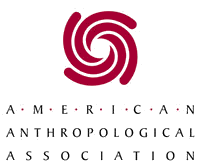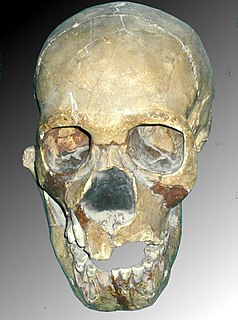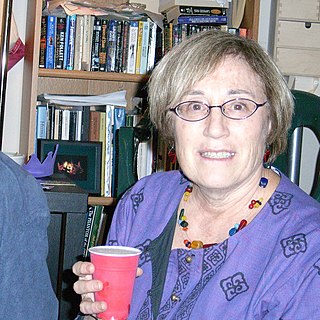Related Research Articles

Anthropology is the scientific study of humanity, concerned with human behavior, human biology, cultures, societies, and linguistics, in both the present and past, including past human species. Social anthropology studies patterns of behavior, while cultural anthropology studies cultural meaning, including norms and values. A portmanteau term sociocultural anthropology is commonly used today. Linguistic anthropology studies how language influences social life. Biological or physical anthropology studies the biological development of humans.

The American Anthropological Association (AAA) is an organization of scholars and practitioners in the field of anthropology. With 10,000 members, the association, based in Arlington, Virginia, includes archaeologists, cultural anthropologists, biological anthropologists, linguistic anthropologists, linguists, medical anthropologists and applied anthropologists in universities and colleges, research institutions, government agencies, museums, corporations and non-profits throughout the world. The AAA publishes more than 20 peer-reviewed scholarly journals, available in print and online through AnthroSource. The AAA was founded in 1902.

The British Academy is the United Kingdom's national academy for the humanities and the social sciences. It was established in 1902 and received its royal charter in the same year. It is now a fellowship of more than 1,000 leading scholars spanning all disciplines across the humanities and social sciences and a funding body for research projects across the United Kingdom. The academy is a self-governing and independent registered charity, based at 10–11 Carlton House Terrace in London.

The American Geophysical Union (AGU) is a 501(c)(3) nonprofit organization of Earth, atmospheric, ocean, hydrologic, space, and planetary scientists and enthusiasts that according to their website includes 130,000 people. AGU's activities are focused on the organization and dissemination of scientific information in the interdisciplinary and international fields within the Earth and space sciences. The geophysical sciences involve four fundamental areas: atmospheric and ocean sciences; solid-Earth sciences; hydrologic sciences; and space sciences. The organization's headquarters is located on Florida Avenue in Washington, D.C.

Calyampudi Radhakrishna Rao FRS, commonly known as C. R. Rao, is an Indian-American mathematician and statistician. He is currently professor emeritus at Pennsylvania State University and Research Professor at the University at Buffalo. Rao has been honoured by numerous colloquia, honorary degrees, and festschrifts and was awarded the US National Medal of Science in 2002. The American Statistical Association has described him as "a living legend whose work has influenced not just statistics, but has had far reaching implications for fields as varied as economics, genetics, anthropology, geology, national planning, demography, biometry, and medicine." The Times of India listed Rao as one of the top 10 Indian scientists of all time. Rao is also a Senior Policy and Statistics advisor for the Indian Heart Association non-profit focused on raising South Asian cardiovascular disease awareness.

The Nautical Archaeology Society (NAS) is a charity registered in England and Wales and in Scotland and is a company limited by guarantee.

Teshik-Tash 1 is a Neanderthal skeleton discovered in 1938 in Teshik-Tash Cave, in the Bajsuntau mountain range, Uzbek SSR, Central Asia.
Charles Kimberlin Brain, also known as C. K. "Bob" Brain, is a South African paleontologist who has studied and taught African cave taphonomy for more than fifty years.
Andrew Shaw Goudie is a geographer at the University of Oxford specialising in desert geomorphology, dust storms, weathering, and climatic change in the tropics. He is also known for his teaching and best-selling textbooks on human impacts on the environment. He is the author, co-author, editor, or co-editor of forty-one books and more than two hundred papers published in learned journals. He combines research and some teaching with administrative roles.
Frances Jane Hassler Hill was an American anthropologist and linguist who worked extensively with Native American languages of the Uto-Aztecan language family and anthropological linguistics of North American communities.
Leslie Spier was an American anthropologist best known for his ethnographic studies of American Indians. He spent a great deal of his professional life as a teacher; he retired in 1955 and died in 1961.
George J. Armelagos was an American anthropologist, and Goodrich C. White Professor of Anthropology at Emory University in Atlanta, Georgia. Armelagos significantly impacted the field of physical anthropology in the disciplines of paleopathology and bioarchaeology. His work has provided invaluable contributions to the theoretical and methodological understanding human disease, diet and human variation within an evolutionary context. Relevant topics include epidemiology, paleopathology, paleodemography, bioarchaeology, evolutionary medicine, and the social interpretations of race, among others.
The Society for Historical Archaeology (SHA) is a professional organization of scholars concerned with the archaeology of the modern world. Founded in 1967, the SHA promotes scholarly research and the dissemination of knowledge pertaining to historical archaeology. The society is specifically interested in the identification, excavation, interpretation, and conservation of sites and materials on land and underwater. It is the largest such organization in the world and the third largest anthropological organization in the United States.

Joan Margaret Gero was an American archaeologist and pioneer of feminist archaeology. Her research focused on gender and power issues in prehistory, particularly in the Andean regions of Argentina and Peru.
Howard Morphy is a British anthropologist who has conducted extensive fieldwork in northern Australia, mainly among the Yolngu people. He was founding director of the Research School of Humanities and the Arts at the Australian National University and is currently a distinguished professor of anthropology.
References
- ↑ "Viking Fund Medal". wennergren.org. Retrieved October 20, 2015.
- ↑ "ZSU Anthropology". Archived from the original on April 26, 2014. Retrieved April 25, 2014.
- ↑ Wood, Bernard (2013). "22 V.". Wiley-Blackwell Encyclopedia Of Human Evolution. Chichester, West Sussex, UK: Wiley-Blackwell. ISBN 978-1-4443-4247-5.
- ↑ "RESEARCH GROUP IN ARCHEOMETRY FORMED AT UTAH". Anthropology News. 13 (6): 6. 1972. doi: 10.1111/an.1972.13.6.6.3 . ISSN 1541-6151.